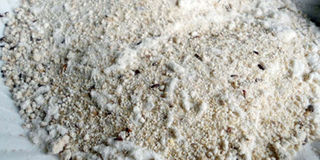Nodding patients fed on rotting relief food

The contaminated posho displayed by some of the patients at Atanga Health Centre III in Pader. Photo by Robert Owot
What you need to know:
While the district officials insist that the Red Cross and Office of the Prime Minister are responsible for the mess, the two deny supplying expired fortified food.
Pader
Children affected by the nodding syndrome in Pader District could be at risk, following the supply of expired fortified food by the Prime Minister’s Office. The food, that was delivered a month ago to Atanga Nodding Disease Treatment Centre, was distributed about 10 days ago.
Other centres that received food supplies are Kitgum Hospital and Palabek-Kal Health Centre in Lamwo District. The supplements, supplied by the OPM in collaboration with the Ministry of Health, is aimed at boosting the children’s immunities.
Parents, whose children are affected by the syndrome say the food is not fit for consumption as it has weevils, maggots and has a foul smell.
A 36-year-old mother from Obolo Village in Laguti Sub-county said the posho which she received last week has maggots. “I received 10 kilogrammes of posho, and three kilogrammes of beans to feed my daughter that has nodding syndrome, but the posho reduced to about six kilogrammes when I sieved maggots and other insects,” she said on condition of anonymity for fear of reprisal.
Parents said although their Ward leaders repeatedly reported their concerns to the authorities, no action has been taken. Following the developments, some parents are reportedly threatening to leave the centre if the situation continues.
A senior official at Atanga feeding centre, who preferred anonymity because he is not allowed to talk to the press, said when the fortified foods where delivered about a month ago, they realised that some bags of maize flour were rotten but they remained silent because leaders said it could tarnish government’s image.
Pader District nodding syndrome focal person, also acting District Health Officer, Mr Vincent Oyet, could neither deny nor acknowledge the claims, saying he would only comment “after receiving formal complaints regarding the mess.”
But the District Secretary for Health, Mr Walter Raleigh Okello, said some recently-supplied bags of posho cannot be consumed because “they have already gone bad.”
He, however, denied that they distributed the food to the affected families. “No single child affected by the nodding syndrome from Atanga treatment centre has been fed with the rotten food because we have asked the management there to give them away to those with pigs for feeding their animals.”
The in-charge of Atanga Health Centre III, Mr Luciyamoi Jacks Onyut, dismissed the claims as baseless and only meant to tarnish the image of the centre that is helping the nodding syndrome patients recover. “Who told you that we have rotten foods in our stores? Tell me who told you that we are feeding the patients with rotten food,” Mr Onyut asked.
Pader RDC Catherine Lamwaka said: “What I know is that it was only the first consignment from the Uganda Red Cross Society that had about five bags that were discovered rotten due to poor storage and were given out to those with pigs.” But Uganda Red Cross Society, blamed for delivering the first batch of food supplies, some of which were discovered rotten in March, distanced itself from the mess.
The Society’s Spokesperson Catherine Ntabadde said: “We only came in to transport and distribute the foods as partners, the foods came from Office of the Prime Minister which is our partner, we don’t deal in foods, we only helped them.”
The Permanent Secretary in the PM’s office, Mr Pius Bigirimana, during a phone interview over the matter on Friday disputed the claims, saying: “We don’t store rotten food in our stores, in fact in the last four years, I have not heard about rotten food in our stores.” Efforts to get comments from health ministry officials were futile as they were reported locked in a meeting over the current interventions in regards to the syndrome.
Meanwhile, a guardian of one of the children, who requested for anonymity because of fear of possible reprisal, said: “We rather return to our village to survive on our harvests than feed on substandard and food that is distributed only once in a month.” Although the food was meant to be supplied twice monthly to patients in the centre, the families now receive it monthly. “It’s a waste of time to get the foods monthly because the quantity does not take the family throughout the month,” a mother in Lacekocot said.
The distribution of fortified foods to nodding syndrome victims is one of the emergency interventions adopted early this year by government to manage the ailment whose cause and mode of spread is unknown.
Since March 24, when the food aid programme started, a total of 620 bags of maize flour and 166 bags of beans, have been procured at the treatment store from the PM’s office. Each bag is 100 kilogramme.
At least 334 bags of maize flour and 67 bags of beans have been distributed to in-patients. Atanga feeding center currently has 21 resident children as many parents have returned to their homes after noting improvement in their children’s conditions.




